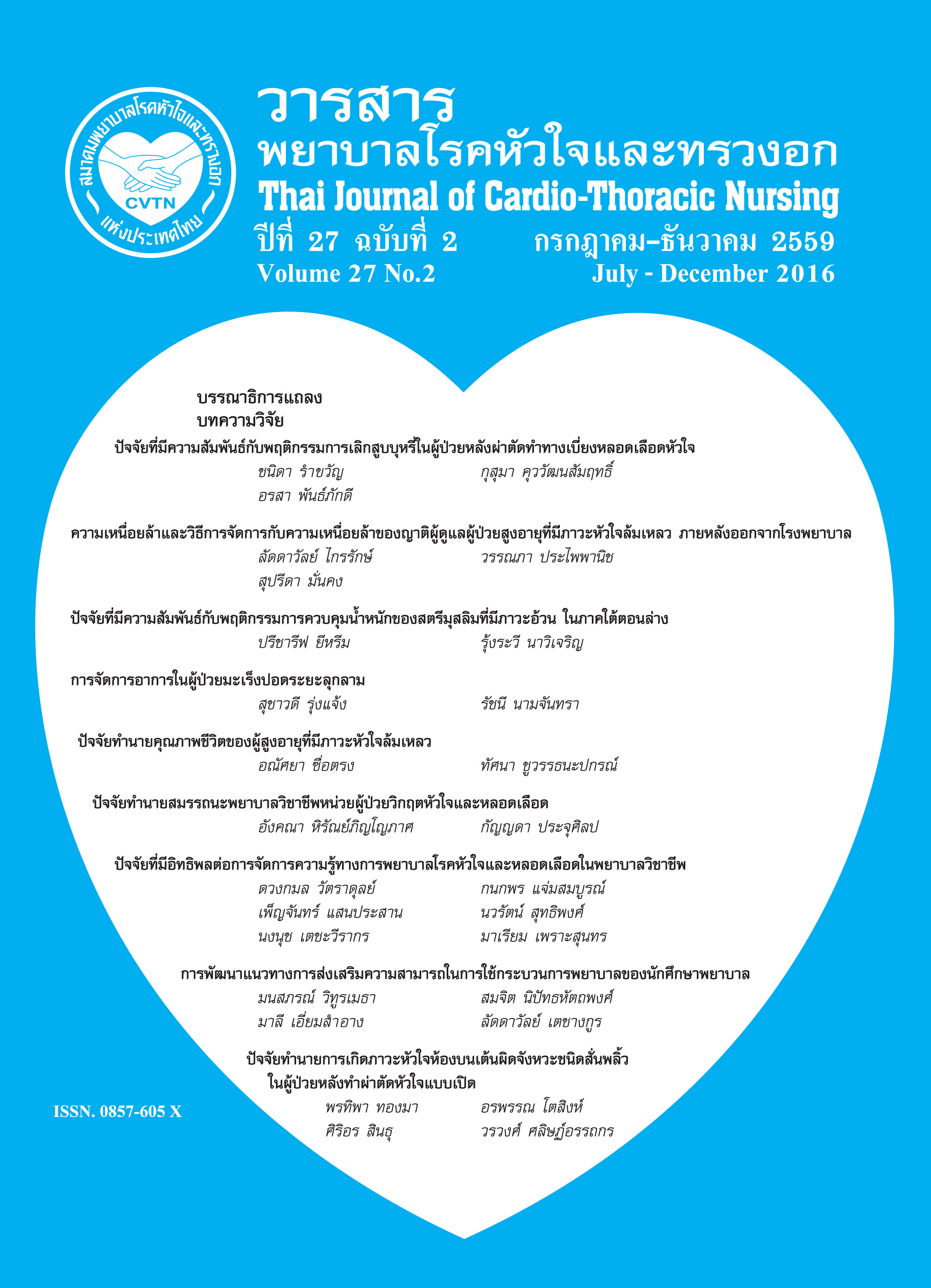ปัจจัยทำนายการเกิดภาวะหัวใจห้องบนเต้นผิดจังหวะชนิดสั่นพลิ้วในผู้ป่วยหลังทำผ่าตัดหัวใจแบบเปิด
Keywords:
หัวใจห้องบนเต้นผิดจังหวะชนิดสั่นพลิ้ว, การผ่าตัดหัวใจแบบเปิด, ผู้ป่วยที่ได้รับการทำผ่าตัดหัวใจแบบเปิด, atrial fibrillation, open heart surgery, patients undergone open-heart surgeryAbstract
การวิจัยเชิงบรรยายนี้มีวัตถุประสงค์เพื่อศึกษาปัจจัยทำนายการเกิดภาวะหัวใจห้องบนเต้นผิดจังหวะชนิดสั่นพลิ้วหลังผ่าตัดหัวใจแบบเปิด กลุ่มตัวอย่างเป็นผู้ป่วยที่ได้รับการทำผ่าตัดหัวใจแบบเปิดจำนวน 150 ราย ในโรงพยาบาลระดับตติยภูมิ ในกรุงเทพมหานคร เก็บรวบรวมข้อมูลโดยใช้แบบบันทึกข้อมูลส่วนบุคคล ข้อมูลเกี่ยวกับการเจ็บป่วย และการรักษา แบบบันทึกอัตราการกรองของเสียที่ไต แบบประเมินกลุ่มอาการการตอบสนองต่อการอักเสบทั่วร่างกาย และแบบประเมินการเกิดภาวะหัวใจห้องบนเต้นผิดจังหวะชนิดสั่นพลิ้ว วิเคราะห์ข้อมูลด้วยสถิติพรรณนาและสถิติวิเคราะห์การถดถอยโลจิสติค
ผลการวิจัยพบว่า ปัจจัยที่มีความสัมพันธ์และสามารถทำนายการเกิดภาวะหัวใจห้องบนเต้นผิดจังหวะชนิดสั่นพลิ้วได้แก่ คะแนนของกลุ่มอาการการตอบสนองต่อการอักเสบทั่วร่างกายมากกว่าหรือเท่ากับ 2 คะแนนขึ้นไป (odds ratio, 4.869; 95% CI, 2.277-10.408; p < 0.001) อายุ 50- 60 ปี (odds ratio, 3.542; 95% CI, 0.987-12.703; p=0.041) และระยะเวลาการใช้เครื่องหัวใจ และปอดเทียม >150 นาที (odds, ratio,3.123; 95% CI, 1.276-7.644; p=0.010)
ผลการวิจัยเสนอแนะว่าพยาบาลควรนำปัจจัยที่สามารถทำนายการเกิดภาวะหัวใจห้องบนเต้นผิดจังหวะชนิดสั่นพลิ้วหลังผ่าตัดหัวใจแบบเปิดมาพัฒนาเป็นแนวปฏิบัติทางการพยาบาลไปใช้เป็นแนวทางการประเมินผู้ป่วยหลังผ่าตัดหัวใจแบบเปิด
Predicting factors on atrial fibrillation among patients undergoing open heart surgery
The purpose of this descriptive research was to study the predictive factors of Atrial Fibrillation (AF) in postoperative open-heart surgery patients. The sample group of 150 subjects who undergone open-heart surgery at tertiary hospitals in Bangkok. The data collection instrumentation was composed of a form for recording demographic and illness/treatment data; a form for recording glomerular filtration rate (GFR); a systemic inflammatory response syndrome (SIRS) evaluation form and an atrial fibrillation evaluation form. Data was analyzed by determining range, mean, standard deviation, chi-square testing and logistic regression analysis.
The results found that the factors to be correlated with and capable of predicting AF were SIRS scores of two points and over (odds ratio, 4.869; 95% CI, 2.277-10.408; p < 0.001), age between fifty to sixty years (odds ratio, 3.542; 95% CI, 0.987-12.703; p = 0.041) and cardio-pulmonary bypass (CPB) time of over 150 minutes (odds ratio, 3.123; 95% CI, 1.276-7.644; p=0.010).
This study suggests that nurses should develop practice guidelines for evaluating the occurrence of AF in patients who have undergone open-heart surgery by using the influencing factors from this study
Downloads
How to Cite
Issue
Section
License
บทความนี้ยังไม่เคยตีพิมพ์หรืออยู่ในระหว่างส่งไปตีพิมพ์ในวารสารอื่น ๆ มาก่อน และกองบรรณาธิการขอสงวนสิทธิ์ในการตรวจทาน และแก้ไขต้นฉบับตามเกณฑ์ของวารสาร ในกรณีที่เรื่องของท่านได้ได้รับการตีพิมพ์ในวารสารฉบับนี้ถือว่าเป็น ลิขสิทธิ์ของวารสารพยาบาลโรคหัวใจและทรวงอก






